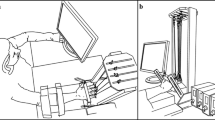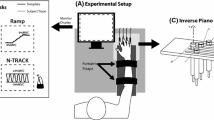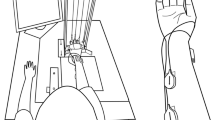Abstract
We addressed a hypothesis that changes in indices of finger interaction during maximal force production (MVC) tasks are accompanied by changed coordination of fingers in multi-finger accurate force production tasks. To modify relative involvement of extrinsic and intrinsic hand muscles, the subjects produced force by pressing either at their distal phalanges or at their proximal phalanges. As in earlier studies, in MVC trials, the elderly subjects showed a greater force decline when pressing at the proximal phalanges as compared to pressing at the distal phalanges. Two methods were applied to analyze finger coordination during the task of four-finger force production from zero to 30% of MVC over 5 s, at the level of finger forces (performance variables) and at the level of modes (control variables). Our previous observations of higher indices of variability during the ramp task in elderly subjects have been generalized to both sites of force application. An index of finger force covariation (the difference between the variance of the total force and the sum of the variances of individual finger forces) revealed small age related differences, which did not depend on the site of the force application. In contrast, analysis of covariation of force modes within the uncontrolled manifold (UCM) hypothesis showed much better stabilization of the time profile of the total force by young subjects. The UCM hypothesis was also used to test stabilization of the pronation/supination moment during the ramp task. Young subjects showed better moment stabilization than elderly. Age related differences in both force- and moment-stabilization effects were particularly strong during force application at the proximal phalanges. We conclude that the drop in MVC is accompanied in elderly subjects with worse coordination of control signals to fingers in multi-finger tasks. The UCM analysis was more powerful as compared to analysis of force variance profiles in revealing significant differences between the groups. This general result underscores the importance of efforts to analyze motor coordination using control rather than performance variables.





Similar content being viewed by others
References
Baud-Bovy G, Soechting JF (2001) Two virtual fingers in the control of the tripod grasp. J Neurophysiol 86:604–615
Baud-Bovy G, Soechting JF (2002) Factors influencing variability in load forces in a tripod grasp. Exp Brain Res 143:57–66
Bernstein NA (1947) On the construction of movements (in Russian). Medgiz, Moscow
Bernstein NA (1967) The co-ordination and regulation of movements. Pergamon Press, Oxford
Cavanaugh JT, Shinberg M, Ray L, Shipp KM, Kuchibhatla M, Schenkman M (1999) Kinematic characterization of standing reach: comparison of younger vs. older subjects. Clin Biomech 1999 14:271–279
Christ CB, Boileau RA, Slaughtr MH, Stillman RJ, Cameron JA, Massey BH (1992) Maximal voluntary isometric force production characteristics of six muscle groups in women aged 25 to 74 years. Am J Hum Biol 4:537–545
Christou EA, Shinohara M, Enoka RM (2003) Fluctuations in acceleration during voluntary contractions lead to greater impairment of movement accuracy in old adults. J Appl Physiol 95:373–384
Cole KJ, Abbs JH (1987) Kinematic and electromyographic responses to perturbation of a rapid grasp. J Neurophysiol 57:1498–1510
Cole KJ, Abbs JH (1988) Grip force adjustments evoked by load force perturbations of a grasped object. J Neurophysiol 60:1513–1522
Cole KJ, Rotella DL (2002) Old age impairs the use of arbitrary visual cues for predictive control of fingertip forces during grasp. Exp Brain Res 143:35–41
Cole KJ, Rotella DL, Harper JG (1999) Mechanisms for age-related changes of fingertip forces during precision gripping and lifting in adults. J Neurosci 19:3238–3247
Danion F, Schöner G, Latash ML, Li S, Scholz JP, Zatsiorsky VM (2003) A force mode hypothesis for finger interaction during multi-finger force production tasks. Biol Cybern 88:91–98
DeVita P, Hortobagyi T (2000) Age causes a redistribution of joint torques and powers during gait. J Appl Physiol 88:1804–1811
Era P, Lyyra AL, Viitasalo JT, Heikkinen E (1992) Determinants of isometric muscle strength in men of different ages. Eur J Appl Physiol Occup Physiol 64:84–91
Feldman AG, Ostry DJ, Levin MF, Gribble PL, Mitnitski AB (1998a) Recent tests of the equilibrium-point hypothesis (λ model). Motor Control 2:189–205
Gentilucci M, Caselli L, Secchi C (2003) Finger control in the tripod grasp. Exp Brain Res 149:351–360
Gottlieb GL (1998) Rejecting the equilibrium-point hypothesis. Motor Control 2:10–12
Grabiner MD, Enoka RM (1995) Changes in movement capabilities with aging. Exerc Sport Sci Rev 23:65–104
Ikeda ER, Schenkman ML, Riley PO, Hodge WA (1991) Influence of age on dynamics of rising from a chair. Phys Ther 71:473–481
Kilbreath SL, Gandevia SC (1994) Limited independent flexion of the thumb and fingers in human subjects. J Physiol 479:487–497
Kinoshita H, Murase T, Bandou T (1996) Grip posture and forces during holding cylindrical objects with circular grips. Ergonomics 39:1163–1176
Krishnamoorthy V, Goodman SR, Latash ML, Zatsiorsky VM (2003a) Muscle synergies during shifts of the center of pressure by standing persons: Identification of muscle modes. Biol Cybern 89:152–161
Krishnamoorthy V, Latash ML, Scholz JP, Zatsiorsky VM (2003b) Muscle synergies during shifts of the center of pressure by standing persons. Exp Brain Res 152:281–292
Landsmeer JM, Long C (1965) The mechanism of finger control, based on electromyograms and location analysis. Acta Anat 60:330–347
Larsson L, Ansved T (1995) Effects of ageing on the motor unit. Prog Neurobiol 45:397–458
Latash ML (1993) Control of human movement. Human Kinetics, Urbana, IL
Latash ML, Li Z-M, Zatsiorsky VM (1998) A principle of error compensation studied within a task of force production by a redundant set of fingers. Exp Brain Res 122:131–138
Latash ML, Scholz JP, Danion F, Schöner G (2001) Structure of motor variability in marginally redundant multi-finger force production tasks. Exp Brain Res 141:153–165
Latash ML, Li S, Danion F, Zatsiorsky VM (2002a) Central mechanisms of finger interaction during one- and two-hand force production at distal and proximal phalanges. Brain Res 924:198–208
Latash ML, Scholz JF, Danion F, Schöner G (2002b) Finger coordination during discrete and oscillatory force production tasks. Exp Brain Res 146:412–432
Latash ML, Scholz JP, Schöner G (2002c) Motor control strategies revealed in the structure of motor variability. Exer Sport Sci Rev 30:26–31
Leijnse JN, Snijders CJ, Bonte JE, Landsmeer JM, Kalker JJ, Van der Meulen JC, Sonneveld GJ, Hovius SE (1993) The hand of the musician: the kinematics of the bidigital finger system with anatomical restrictions. J Biomech 26:1169–1179
Li Z-M, Latash ML, Zatsiorsky VM (1998) Force sharing among fingers as a model of the redundancy problem. Exp Brain Res 119:276–286
Li Z-M, Zatsiorsky VM, Latash ML (2000) Contribution of the extrinsic and intrinsic hand muscles to the moments in finger joints. Clin Biomech 15:203–211
Li S, Latash ML, Yue GH, Siemionow V, Sahgal V (2003) The effects of stroke and age on finger interaction in multi-finger force production tasks. Clin Neurophysiol 114:1646–1655
Loève M (1977) Probability theory I, 4th edn. Springer-Verlag, New York
Long C (1965) Intrinsic-extrinsic muscle control of the fingers. J Bone Joint Surg Am 50:973–984
Newell KM, Corcos DM (eds) (1993) Variability in motor control. Human Kinetics, Urbana, IL
Ranganathan VK, Siemionow V, Sahgal V, Yue GH (2001) Effects of aging on hand function. J Am Geriatr Soc 49:1478–1484
Rearick MP, Santello M (2002) Force synergies for multifingered grasping: effect of predictability in object center of mass and handedness. Exp Brain Res 144:38–49
Reilmann R, Gordon AM, Henningsen H (2001) Initiation and development of fingertip forces during whole-hand grasping. Exp Brain Res 140:443–452
Rice CL, Cunningham DA (2002) Aging of the neuromuscular system: influences of gender and physical activity. In: Shephard RJ (ed) Gender, physical activity, and aging. CRC Press, Boca Raton, FL, pp 121–150
Santello M, Soechting JF (2000) Force synergies for multifingered grasping. Exp Brain Res 133:457–467
Scholz JP, Schöner G (1999) The uncontrolled manifold concept: identifying control variables for a functional task. Exp Brain Res 126:289–306
Scholz JP, Schöner G, Latash ML (2000) Identifying the control structure of multijoint coordination during pistol shooting. Exp Brain Res 135:382–404
Scholz JP, Danion F, Latash ML, Schöner G (2002) Understanding finger coordination through analysis of the structure of force variability. Biol Cybern 86:29–39
Scholz JP, Kang N, Patterson D, Latash ML (2003) Uncontrolled manifold analysis of single trials during multi-finger force production by persons with and without Down syndrome. Exp Brain Res 153:45–58
Shinohara M, Li S, Kang N, Zatsiorsky VM, Latash ML (2003a) Effects of age and gender on finger coordination in maximal contractions and submaximal force matching tasks. J Appl Physiol 94:259–270
Shinohara M, Latash ML, Zatsiorsky VM (2003b) Age effects on force production by the intrinsic and extrinsic hand muscles and finger interaction during maximal contraction tasks. J Appl Physiol 95:1361–1369
Slobounov S, Chiang H, Johnston J, Ray W (2002) Modulated cortical control of individual fingers in experienced musicians: an EEG study. Clin Neurophysiol 113:2013–2024
Vaillancourt DE, Newell KM (2003) Aging and the time and frequency structure of force output variability. J Appl Physiol 94:903–912
Vaillancourt DE, Larsson L, Newell KM (2003) Effects of aging on force variability, single motor unit discharge patterns, and the structure of 10, 20, and 40 Hz EMG activity. Neurobiol Aging 24:25–35
Viitasalo JT, Era P, Leskinen AL, Heikkinen E (1985) Muscular strength profiles and anthropometry in random samples of men aged 31–35, 51–55 and 71–75 years. Ergonomics 28:1563–1574
Zatsiorsky VM, Li Z-M, Latash ML (1998) Coordinated force production in multi-finger tasks. Finger interaction, enslaving effects, and neural network modeling. Biol Cybern 79:139–150
Zatsiorsky VM, Li Z-M, Latash ML (2000) Enslaving effects in multi-finger force production. Exp Brain Res 131:187–195
Acknowledgements
This study was supported in part by NIH grants AG-018751, NS-35032, AR 048563, and M01 RR10732 and NSF grant IBN-0078127. The screening process of the elderly subjects was conducted by Candace Kugel and Elizabeth Abraham under the supervision by Harold Bassett at the General Clinical Research Center (The Pennsylvania State University). The authors are grateful to the staff and participants at the Foxdale Village (State College, PA) for their cooperation.
Author information
Authors and Affiliations
Corresponding author
Rights and permissions
About this article
Cite this article
Shinohara, M., Scholz, J.P., Zatsiorsky, V.M. et al. Finger interaction during accurate multi-finger force production tasks in young and elderly persons. Exp Brain Res 156, 282–292 (2004). https://doi.org/10.1007/s00221-003-1786-9
Received:
Accepted:
Published:
Issue Date:
DOI: https://doi.org/10.1007/s00221-003-1786-9




